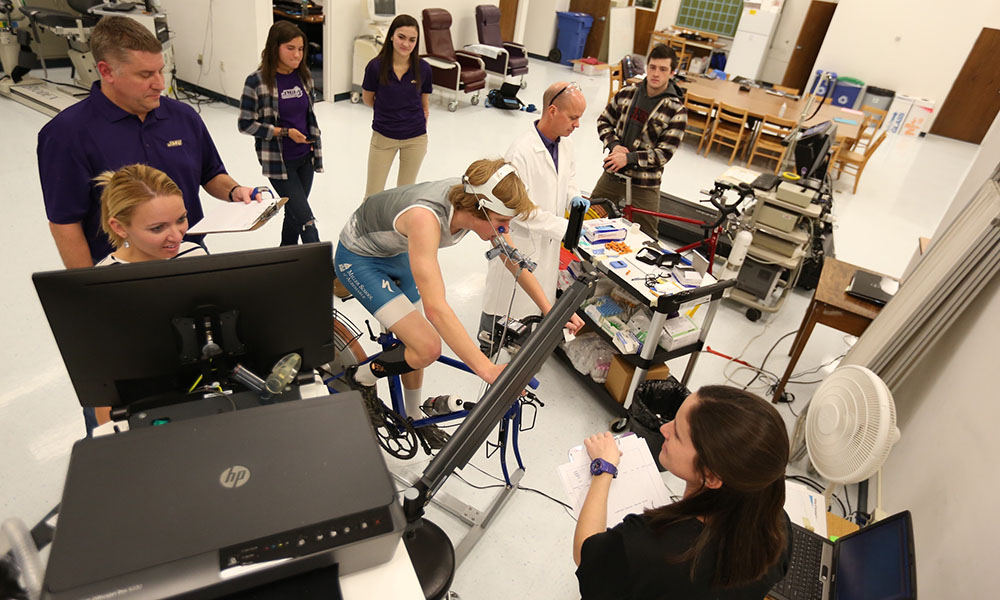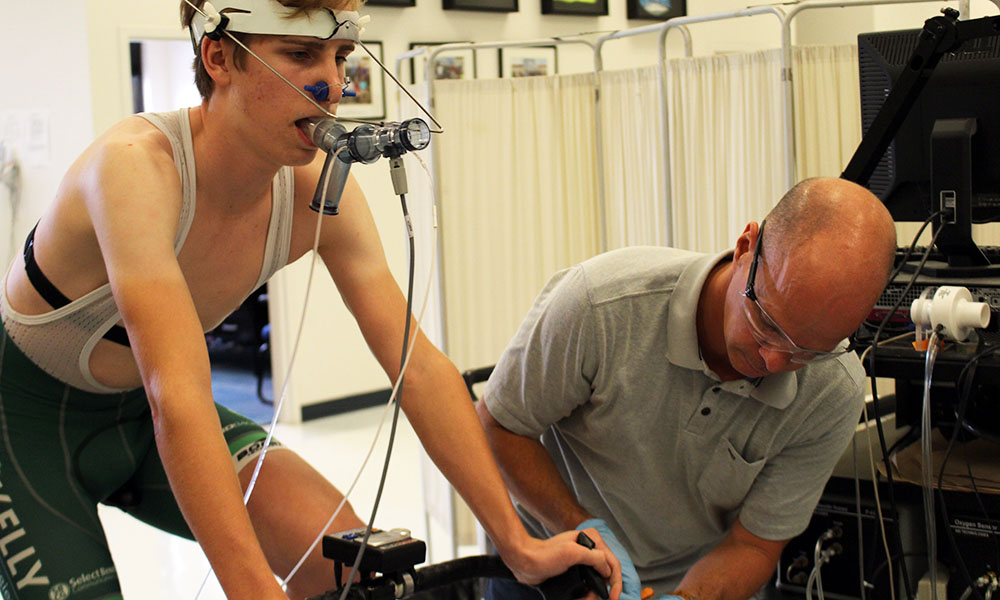Kinesiology and youth cyclists collaborate on research
NewsBy: Shannon Shevlin
Creative Services Student Writer

As practitioners-in-training, it is important for students to test their skills in hands-on settings. Students in JMU’s College of Health and Behavioral Studies (CHBS) show how an active learning environment can foster discovery and problem-solving. Hoping to understand how post-exercise recovery beverages affect youth athletic performance, a group of kinesiology students and faculty spent fall 2018 conducting a collaborative research study with the elite cycling and endurance team at the Miller School of Albemarle (MSA). About 50 miles south of JMU, MSA is home to approximately 175 private school students in grades 8-12. The 1600-acre campus is surrounded by scenic woodlands and miles of pristine bike trails that attract some of the best and brightest young athletes.
MSA’s cycling and endurance team is comprised of roughly 20 students who participate in biking competitions around the world, often pursuing collegiate or professional programs after graduation. These athletes and coaches regularly need concrete measurements to guide their training, and share with recruiters, yet performance testing can be expensive and inaccessible.
A former collegiate runner and competitive cyclist, Mike Saunders currently serves as director of the Human Performance Laboratories at JMU. As a skilled endurance athlete with more than 20 years of experience as a professor of exercise physiology, Saunders makes an excellent resource for students and coaches at MSA.
Similarly, MSA’s unique infrastructure and athletic talent present an exciting opportunity for translational research in Saunders’ area of expertise. Because young athletes are often understudied, Saunders wanted to address current gaps and assess research validity in youth. This relationship between JMU and MSA grew stronger throughout 2018, leading to an engaging experimental study in the fall.
Saunders recruited colleague Nicholas Luden, along with two undergraduate and two graduate students to lead this collaboration. From September through December 2018, the team worked alongside MSA students three days per week. They arrived at MSA around 5 a.m. to set up a portable lab before giving athletes a 90-minute high-intensity interval training (HIIT) workout at 6 a.m. Students followed their normal class schedule and drank two servings of a recovery beverage throughout the day before returning to the lab to complete a mock-race timed trial.
Athletes completed these trials on three occasions, receiving either a high-carbohydrate test beverage, a carbohydrate-protein beverage (chocolate milk) or a placebo, but drank “blindly” to prevent any bias or psychological influence on their performance. The tested beverages were designed to address the three R’s of recovery – refuel, repair and rehydrate – showing how different combinations of nutrients affected performance. With enough carbohydrates to refuel, protein to repair and fluid/calcium to rehydrate, chocolate milk is more than a childhood favorite, but also an effective recovery beverage for endurance athletes.

Saunders discussed goals of this research, emphasizing the primary objective was to determine the effects of dietary manipulations on post-exercise recovery, and subsequent exercise performance. He said, “We wanted to see how we can help highly talented athletes perform even better.” He asked, “Are there things we can tweak in the dietary environment to help these athletes get the most out of their training?”
While the team is still analyzing data and assessing implications of the study, both students and faculty enjoyed the hands-on nature of this project. Senior Kinesiology major Allison Cadematori noted how she gained improved efficacy and confidence as a practitioner. After graduation in May, Cadematori will begin a Doctor of Physical Therapy (DPT) program at VCU in the fall. She is passionate about working with children, and hopes to apply lessons from this experience to her future career. She articulated, “Being able to problem-solve and think quickly in the moment was a challenge, but this experience has made me feel more prepared for a career [in PT].”
Second-year graduate student, Andrew Law, is using this research toward his master’s thesis. A climbing and powerlifting aficionado, Law hopes to pursue a career in research after earning his M.S. in Exercise Physiology this May. He enjoyed how immersive the study was and expressed, “Hands-on experience is important because it can really be a guide. It lets you explore where your interests are.” He continued, “You can't know if you’ll enjoy anything unless you do it – that’s why activities like this or internships are so important.”
For Saunders, building a partnership and strengthening relationships were the most valuable aspects of the project. He expressed gratitude for the opportunity to work with highly motivated athletes who appreciate JMU’s work. Saunders enjoyed getting to know MSA student-athletes and coaches and creating deep and meaningful educational opportunities for them. He expressed, “My job is all about three pillars – research, teaching and service.” He said, “Being creative and finding avenues to integrate all three like this project did is really unique.”

